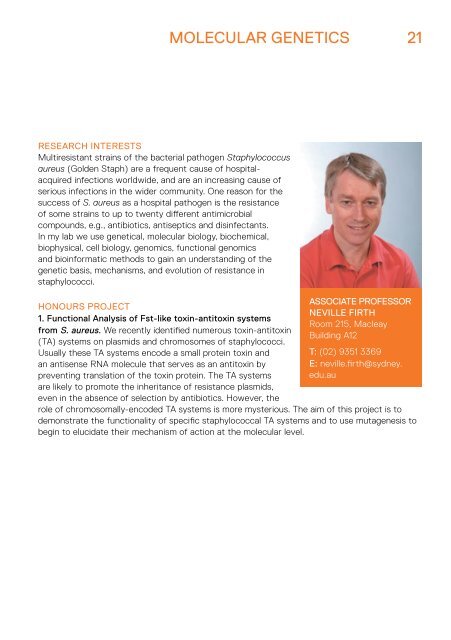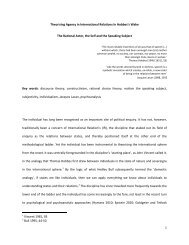biological sciences HONOURs 2014 - The University of Sydney
biological sciences HONOURs 2014 - The University of Sydney
biological sciences HONOURs 2014 - The University of Sydney
Create successful ePaper yourself
Turn your PDF publications into a flip-book with our unique Google optimized e-Paper software.
MOLECULAR GENETICS<br />
21<br />
Research Interests<br />
Multiresistant strains <strong>of</strong> the bacterial pathogen Staphylococcus<br />
aureus (Golden Staph) are a frequent cause <strong>of</strong> hospitalacquired<br />
infections worldwide, and are an increasing cause <strong>of</strong><br />
serious infections in the wider community. One reason for the<br />
success <strong>of</strong> S. aureus as a hospital pathogen is the resistance<br />
<strong>of</strong> some strains to up to twenty different antimicrobial<br />
compounds, e.g., antibiotics, antiseptics and disinfectants.<br />
In my lab we use genetical, molecular biology, biochemical,<br />
biophysical, cell biology, genomics, functional genomics<br />
and bioinformatic methods to gain an understanding <strong>of</strong> the<br />
genetic basis, mechanisms, and evolution <strong>of</strong> resistance in<br />
staphylococci.<br />
Honours project<br />
1. Functional Analysis <strong>of</strong> Fst-like toxin-antitoxin systems<br />
from S. aureus. We recently identified numerous toxin-antitoxin<br />
(TA) systems on plasmids and chromosomes <strong>of</strong> staphylococci.<br />
Usually these TA systems encode a small protein toxin and<br />
an antisense RNA molecule that serves as an antitoxin by<br />
preventing translation <strong>of</strong> the toxin protein. <strong>The</strong> TA systems<br />
are likely to promote the inheritance <strong>of</strong> resistance plasmids,<br />
even in the absence <strong>of</strong> selection by antibiotics. However, the<br />
Associate Pr<strong>of</strong>essor<br />
Neville Firth<br />
Room 215, Macleay<br />
Building A12<br />
T: (02) 9351 3369<br />
E: neville.firth@sydney.<br />
edu.au<br />
role <strong>of</strong> chromosomally-encoded TA systems is more mysterious. <strong>The</strong> aim <strong>of</strong> this project is to<br />
demonstrate the functionality <strong>of</strong> specific staphylococcal TA systems and to use mutagenesis to<br />
begin to elucidate their mechanism <strong>of</strong> action at the molecular level.
















